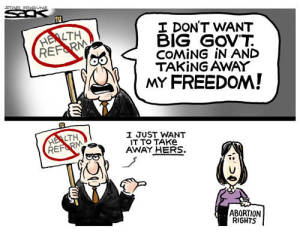http://www.politico.com/wuerker/2014/06/june-2014/001868-027314.html
For the Moses Cartoon
http://www.cartoonstock.com/directory/r/reproductive_rights.asp
Self-Ownership—by Ayala Emmett
Republican leaders came to Washington last week to do the people’s business. They were rightly energized by the elections and animated by the fact that they now have a comfortable majority in both houses of congress. There are numerous issues facing the nation in 2015, such as endemic racism, immigration, growing economic disparities, soaring students loans, crumbling infrastructure, failing schools, and global warming.

The House of Representatives chose, as its first piece of legislation, a bill to criminalize most abortions after 20 weeks of pregnancy. They hoped to have this vote to restrict self-ownership on the anniversary of Roe v. Wade on January 22, 2015. The Republican bill failed because women within its own ranks said, “No.”
The Republican women’s revolt was articulated by Representative Jackie Walorski, an Indiana Republican, who said, “We have a responsibility…to protect the most vulnerable among us and ensure that women facing unwanted pregnancies do not face judgment or condemnation.”
Beyond the ethical concerns that Congresswoman Walorski raised, there is the notion of self-ownership in democracies. In a democracy, self-ownership, the right over one’s body must be the same for all citizens, male and female. Women’s right to their bodies is a fundamental civil right of self-ownership in democracies and a right that was violated during slavery.
The congressmen who proposed to impose severe restrictions on abortion ignored the fact that what they proposed was both undemocratic and un-American. Self-ownership reflects the American value of individual sovereignty and autonomy described so eloquently by Tocqueville as the American faith that individuals have the right to determine “their destiny.” For women shaping their destiny means to decide whether or not to have children and if they choose to have children, when they would like to have them. Self-ownership means that when it is violated, when women are sexually assaulted, raped and forcefully impregnated they do not have to suffer a compounding violation of their individual autonomy by forced pregnancy.
Beyond the voting right women’s greatest civil rights win has been self-ownership, the right over their own bodies that came with legalization of reproductive rights encoded in Roe v. Wade. The Republican congressmen who proposed new restrictions also ignored the fact that it is un-American to inject religious beliefs into nullifying women’s right of self-ownership. To inject specific religious beliefs into reproductive choices violates the separation of church and state and ignores the American principle of freedom from religious coercion.
The right of women’s self-ownership can’t be abrogated by a particular religious belief objecting to contraceptives or abortion. This right to freedom from religious coercion was the argument made by Justice Ginsburg in the Hobby Lobby case. The Justice wrote that for Hobby Lobby to deny women comprehensive health care, “would deny legions of women who do not hold their employers’ beliefs access to contraceptive coverage that the ACA would otherwise secure.”
On July 30 2014 SCOTUS decided 5-4 to allow corporate self-ownership outweigh women’s right. This 5-4 division in the Supreme Court resulted in Justice Ruth Bader Ginsburg filing a dissenting opinion joined by Justice Sonia Sotomayor and mostly joined by Justices Elena Kagan and Stephen Breyer. Three women, and one man disagreed with five men about the law. The disagreement is an important reminder that the legal system is an interpretative/ideological science that at times undermines American civil rights in states and in the Supreme Court. In the case of Hobby Lobby the highest court of the land increased the rights of corporations and reduced the civil rights of women.
Justice Alito justified his decision in favor of Hobby Lobby writing that, “the humans who own and control those companies” are those who matter. To sit on the Supreme Court or in Congress are clearly positions of privilege and immense power that must come with a responsibility not to harm a class of people, in this case women. The Hobby Lobby decision and the Republicans’ attempts to restrict abortions rights offer a glimpse of how two powerful branches of the government act to override women’s civil rights. The Supreme Court had the vote, and this time around the Republican congressmen did not.
What are some civic lessons that American citizens can draw from the acts of these two branches of government? One inference is surely that democracies need constant watching over because under the veil of democracy the right to self-ownership can be taken away in a blink of a vote.
http://www.usatoday.com/story/news/nation/2014/06/30/hobby-lobby-excerpts-ruling-dissent/11790835/
Cartoon:
http://www.occasionalplanet.org/2013/07/19/the-war-on-reproductive-rights-a-roundup-of-political-cartoons/